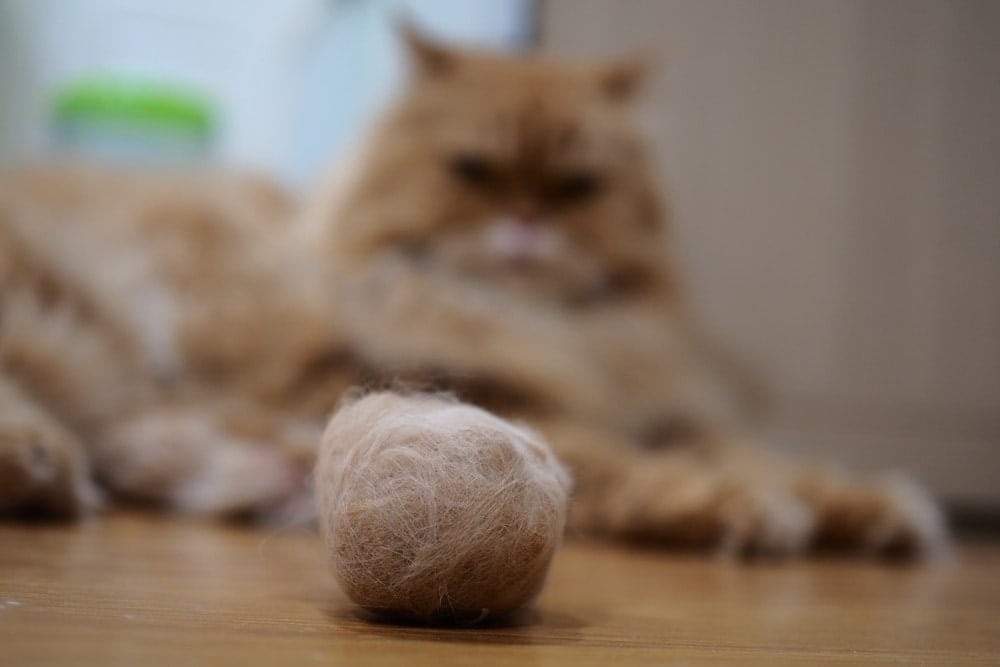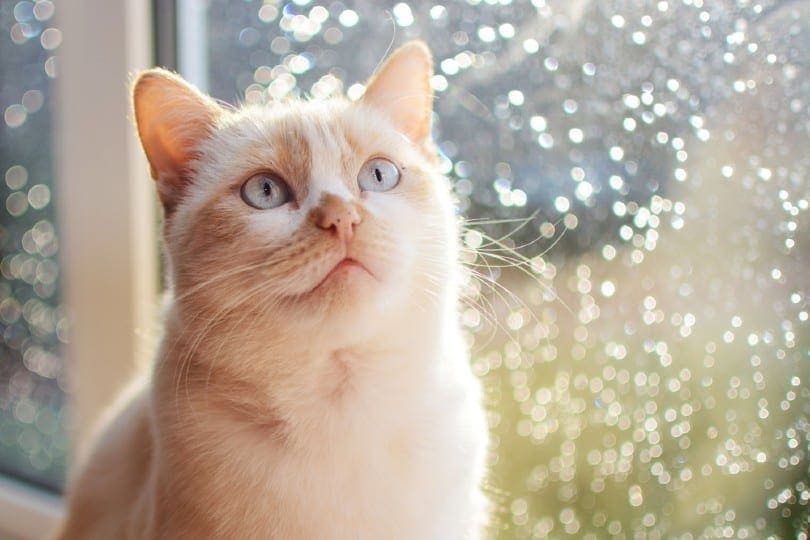Why Is My Older Cat Losing Weight? 12 Likely Vet-Approved Reasons

Updated on
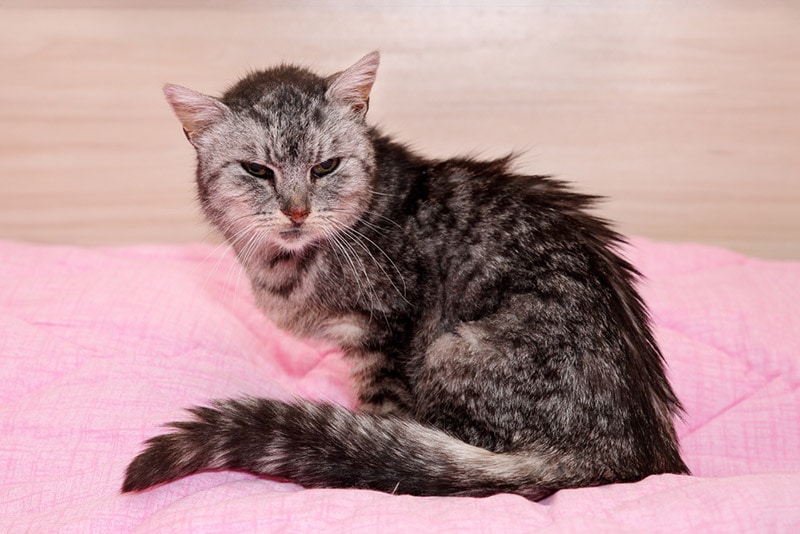
If your cat is losing weight, it’s critical to find out why. While weight loss in older cats may be due to a simple cause such as stress, unexplained weight loss can also be a sign of serious health problems and so it should never be ignored. There are many potential causes of weight loss in cats, including both infectious and non-infectious ailments.
If your older cat is losing weight, read on to find out why as well as the signs to look out for.
The 12 Reasons Why Your Older Cat Is Losing Weight
1. Normal Aging
Weight loss in cats is a natural part of aging and happens through normal changes in the metabolic process, which causes loss of both muscle and general body weight. This happens slowly over time and in small incremental amounts. Weight loss through aging never happens suddenly. Nevertheless, as a cat owner if you notice weight loss you should not assume that it is normal, even for an older cat, until you have had your cat checked out by a veterinarian.
2. Anxiety, Stress, or Depression
Cats of any age when under physiological stress may stop eating, causing them to lose weight. Situations that may upset a cat include interference from other animals either when they eat or in their feeding area, disturbing noises, and issues with their food bowl—including small issues such as placing it too close to the litter box.
A change in their routine such as when a person leaves the home or when another pet is introduced can also be stressful for cats. Relocations are particularly stressful for cats since they are naturally territorial, and being displaced from their familiar territory often leads to stress episodes.
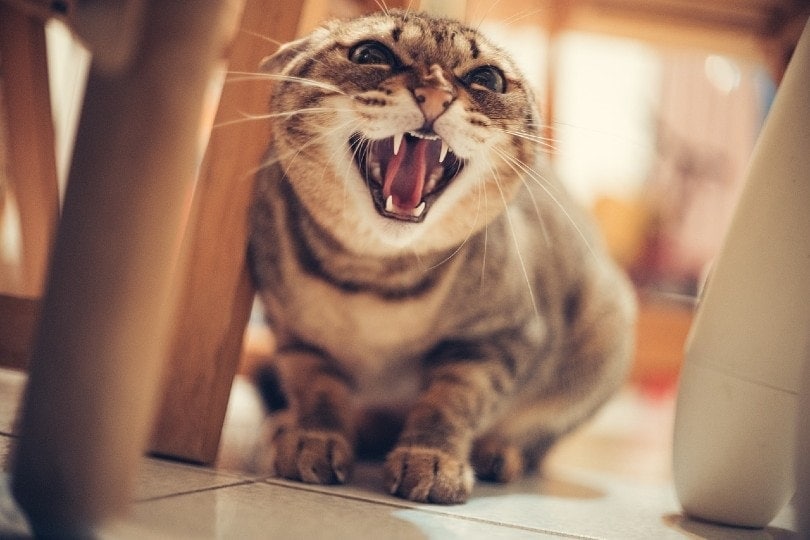
3. Arthritis
Arthritis by itself does not cause cats to lose weight directly, but as the disease progresses and movement gets harder, your cat may find that the effort to get food—even just walking to the food bowl—is very painful. This can cause your cat to cut back on their nutrition which eventually leads to weight loss.
Also, as your cat is moving less, they will most likely lose muscle mass, further exacerbating the weight loss. Certain medications and supplements (mostly those associated with reducing the pain associated with arthritis) are very useful for such cats and something you should consider discussing with your veterinarian.
4. Cancer
Most cancers in cats, wherever they are in the body, can lead to weight loss. As cancer develops, your cat will experience pain and, as a result, become lethargic and less active, and they may also lose their appetite.
In addition, one of the traits of cancer is that it grows very rapidly. This growth isn’t possible without adequate blood and nutrition. In other words, much of what your cat eats may be taken by the growing cancer, resulting in weakness and an overall loss of healthy body tissue. This becomes much worse as the cancer spreads around your cat’s body (this trait is known as malignancy). All these factors mean that cancer is a common cause of weight loss in older cats. It’s important to talk with your veterinarian about how to support your cat if they are diagnosed with cancer.
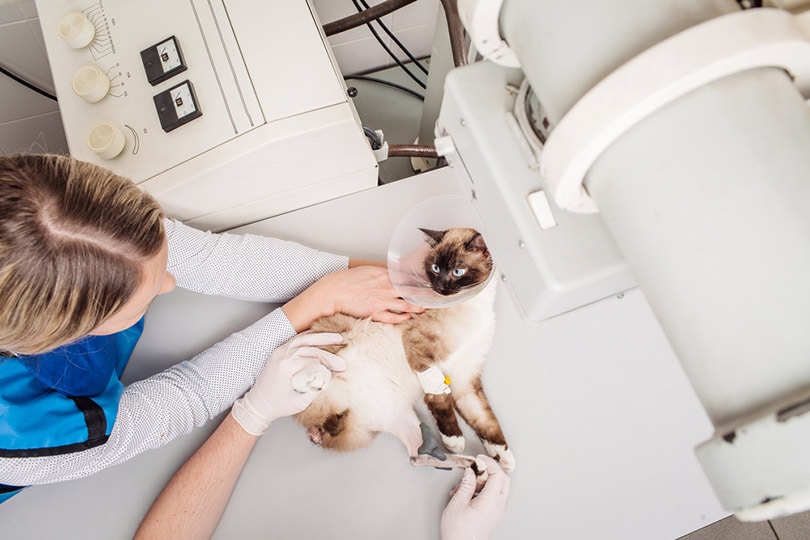
5. Dental or Oral Problems
If your cat suddenly stops eating and begins to lose weight, but seems otherwise healthy, it could be a dental or oral problem. Toothache, gum disease, sore throat, mouth infection, mouth ulcers, and severe gingivitis are all potential causes of your cat’s loss of appetite as they may make eating quite painful and cause your cat to eat less. Drooling and pawing at the mouth may be other signs of a dental issue. If you suspect that your cat’s loss of appetite is due to a dental or oral problem, take them to the vet for an examination. The vet will be able to determine the cause of the problem and recommend the best course of treatment.
6. Diabetes
Diabetes, usually caused by either the body’s ability to produce the hormone insulin or a reduced ability to respond to it, regularly causes cats to lose weight when prolonged. Without insulin or the correct response to insulin, the body can’t use all the calories in the diet for daily energy needs and as a result, a cat may lose body mass. You might also notice your cat drinking more water than usual, urinating more, generally acting sluggish, and maybe having a short temper. Diabetes in cats can be treated with daily insulin injections and dietary adjustments.
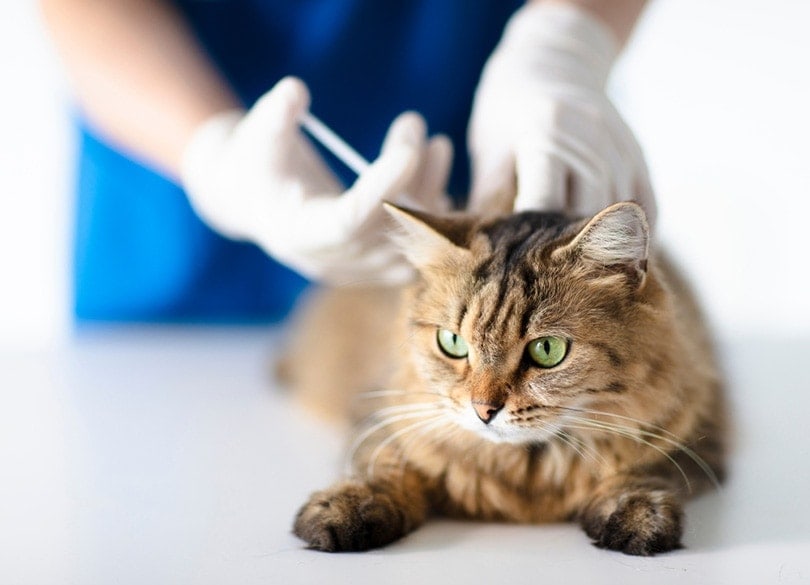
7. Feline Immunodeficiency Virus (FIV)
FIV is the feline equivalent of the human immunodeficiency virus (HIV) and causes a disease similar to acquired immune deficiency syndrome (AIDS) in humans. It is a highly species-specific virus that only infects felines.
The disease has three phases. In the first phase, the acute phase, an infected cat may lose their appetite which will cause the cat to lose weight. The second phase is asymptomatic and may last from months to years, with some cats never progressing beyond it and during which time the cat will not have any outward signs of infection. During the final phase, the cat’s immune system will be compromised, and they will develop secondary infections or diseases, usually leading to death. Cats often lose weight as secondary diseases and infections set in.
There was an FIV vaccine available at one stage but it has been taken off the market in North America 1.
8. Feline Infectious Peritonitis
Feline infectious peritonitis 2 (FIP) is caused by strains of a virus commonly called the feline enteric coronavirus. Feline enteric coronaviruses are usually found in the gastrointestinal tract and do not cause significant disease.
Mutations of these viruses are what cause FIP, though the exact mechanism remains unknown and requires a multitude of factors before it can happen. FIP is often found in catteries where many cats are kept and raised together. Both forms of this infection (termed “wet” or “dry”) can cause a multitude of multi-systemic signs which often result in weight loss as part of the disease process.
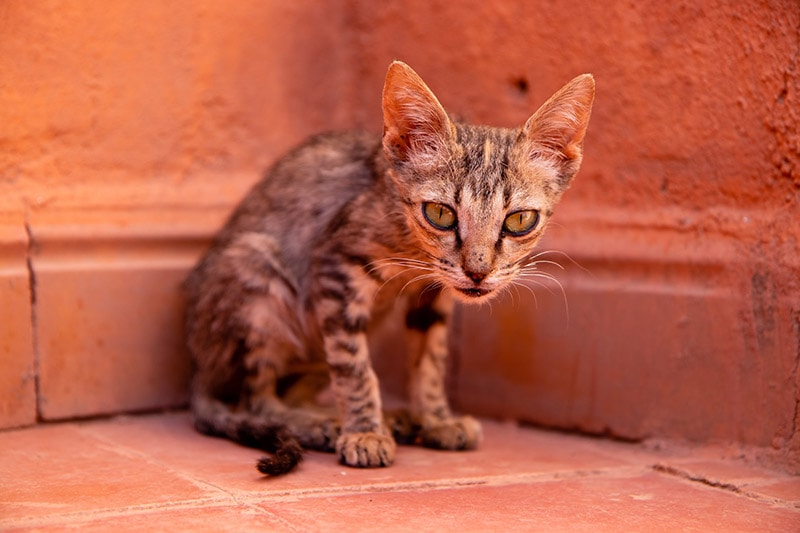
9. Gastrointestinal Problems and Inflammatory Bowel Disease
The gastrointestinal tract can cause cats to lose weight either through poor absorption of nutrition or through loss of appetite. Signs that may accompany weight loss and could indicate a GI problem include diarrhea, vomiting, and a lack of appetite. Diseases that commonly cause GI problems in cats resulting in weight loss include inflammatory bowel disease, malabsorption, liver or bile issues, and certain infections. Parasitic infections and worms are a particularly common cause of GI problems leading to weight loss if infestations are severe.
10. Hyperthyroidism
If your cat is eating normally or eating more than usual and is still losing weight, then they may be suffering from hyperthyroidism 3. Hyperthyroidism is caused by an overactive thyroid hormone which produces too much of its namesake hormone. Imbalances in the thyroid hormone cause an imbalance in your cat’s metabolism, hyperactivity and excitability, muscle wastage, and weight loss.
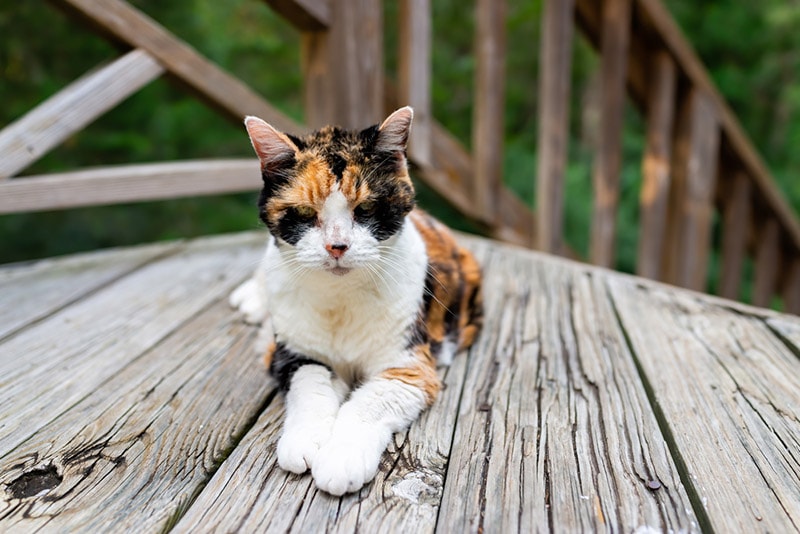
11. Organ Failure
As cats age and as their bodies wear out it is common for organ functions to degrade, causing the cat to change and get sick, although organ disease can happen to young cats as well. Chronic kidney disease 4 is one such illness that is quite common in cats. The accumulation of damage to the kidneys over a lifetime from infections, toxins, and illnesses results in the slow degradation of the function of the kidneys.
An early sign that your cat’s kidneys are not functioning well is an increase in drinking. However, this is easy to miss as it is a sign of many other diseases as well. As the disease progresses your cat may experience weight loss, poor appetite, smelly breath, a sore mouth, vomiting, and weakness.
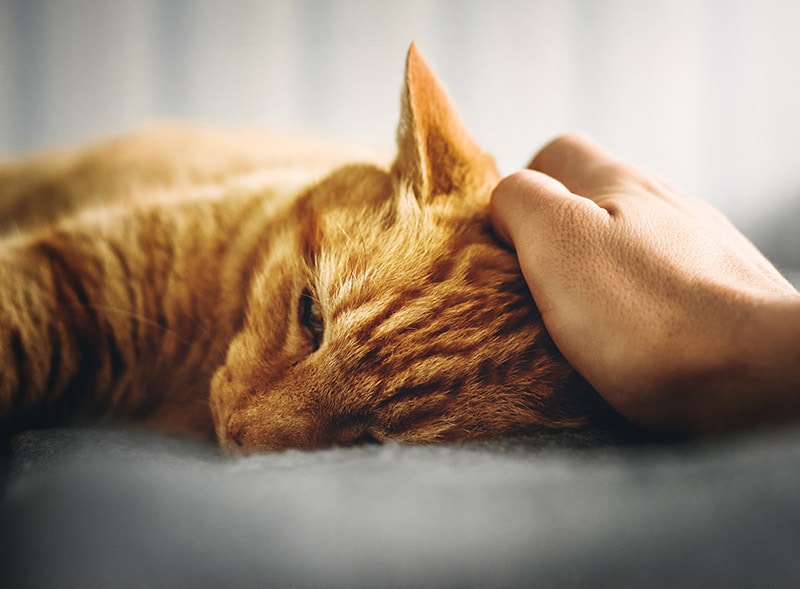
12. Feline Dementia and Other Neurological Issues
Older cats are prone to dementia and other neurological issues. Cats that have dementia are akin to humans who have the same ailment, and at times, they may simply forget routine tasks, such as eating.
Cats with certain neurological issues, such as a brain tumor, may obsessively circle and pace or spend their waking hours head pressing against a wall instead of engaging in normal activities, which include eating. Talk to your veterinarian about behavioral changes you notice in your senior cat.
What’s the Average Lifespan of a House Cat?
The average lifespan of a cat is 12–18 years. House cats typically live longer than outdoor cats and have a life expectancy of about 10 to 15 years, although a few long-lived feline friends can live up to the grand old age of 20. House cats tend to live longer as they have few, if any, predators to worry about, generally have a good and consistent diet, are better protected against the elements and some diseases, are at lower risk of injury, and are looked after in their old age. Taking your cat to the vet for regular checkups will also help your cat to live a nice long life.
Also, you have to monitor your cat food average intake, so ee would also like to hand you a tool to know how much you should feed your cat to maintain their health:
The exact amount of calories an individual animal needs to maintain a healthy weight is variable and influenced by many factors including genetics, age, breed, and activity level. This tool is meant to be used only as a guideline for healthy individuals and does not substitute veterinary advice
Conclusion
In conclusion, old age can take a toll on your cat’s body and one thing to always look out for is weight loss. If you notice that your cat is losing weight, it may be a sign that your cat either has or is developing a serious illness. The reason behind the weight loss can vary from external stresses to infections or parasites to old age itself. Unfortunately, the signs for all of these are very similar and may include loss of appetite, lethargy, vomiting, or diarrhea. Check your cat’s intake of food and water, and their energy levels to see whether they are eating normally then go and visit your veterinarian and have your cat checked out.
Featured Image Credit: Mahlebashieva, Shutterstock


